Overview
The article "10 Essential Tips for Effective Wine Influencer Marketing" presents a compelling exploration of strategies that wineries can adopt to elevate their marketing through influencer partnerships. By aligning with authentic influencers, wineries can craft narratives that resonate deeply with consumers. This approach not only engages the audience but also drives direct-to-consumer sales, a crucial aspect in today’s competitive market.
To capture attention, it’s vital to recognize the power of influencer marketing in the wine industry. Authenticity is key; consumers are more likely to connect with brands that are represented by influencers who genuinely appreciate their products. This alignment fosters trust and encourages engagement.
Moreover, crafting compelling narratives is essential. Wineries should focus on storytelling that highlights their unique offerings and the experiences they provide. This narrative not only captivates potential customers but also creates a desire for the product, making it more than just a purchase—it's an experience.
Measuring campaign success is another critical element. Wineries must implement metrics to evaluate the effectiveness of their influencer partnerships. By analyzing data and feedback, they can refine their strategies and ensure they are meeting their marketing goals.
In conclusion, the article emphasizes that effective wine influencer marketing hinges on authenticity, storytelling, and measurable outcomes. Wineries that embrace these principles will not only enhance their marketing efforts but also foster lasting connections with consumers.
Introduction
In an industry where storytelling and personal connections reign supreme, wine producers are increasingly embracing influencer marketing as a powerful strategy. By collaborating with genuine wine advocates, vineyards can not only enhance their visibility but also foster enduring relationships with consumers, ultimately driving direct-to-consumer (DTC) sales. Yet, as the landscape shifts, how can wineries effectively navigate the complexities of influencer partnerships to maximize their impact and sidestep common pitfalls? This article delves into ten essential tips for successful wine influencer marketing, providing insights that can empower vineyards to thrive in a competitive market.
Enocap: Transform DTC Revenue with Influencer Partnerships
Enocap stands out in empowering vineyards to drive direct-to-consumer (DTC) revenue through strategic partnerships with key individuals, essential for crafting compelling narratives. By utilizing wine influencer marketing and collaborating with influencers who genuinely connect with their target audience, vineyards can significantly enhance their visibility and foster personal relationships with consumers. This approach not only generates immediate sales but also cultivates lasting customer loyalty, establishing strategic partnerships as a vital component of a winery's comprehensive promotional strategy.
Successful marketing campaigns within the wine industry have yielded impressive results. For instance, companies leveraging partnerships with social media personalities have reported sales conversions ranging from 20% to 25%, underscoring the profitability of this promotional strategy. Experts emphasize that in the current competitive landscape, wineries that overlook social media promotion risk falling behind. As one marketing expert aptly stated, 'Wine influencer marketing enables companies to convey their message to a target demographic while selecting ambassadors who align with their ethos.'
The influence of these partnerships in wine influencer marketing extends beyond immediate sales; they are crucial for enhancing brand loyalty and storytelling. By developing authentic narratives and engaging content, vineyards can strengthen their connection with consumers, leading to improved retention rates. Additionally, the rise of micro and mid-tier influencers, who often resonate more with niche communities, offers vineyards a cost-effective way to engage their audience authentically through wine influencer marketing. Moreover, integrating strategic capital planning into these promotional efforts can further enhance the effectiveness of partnership arrangements, ensuring that vineyards not only attract customers but also secure the necessary resources for sustainable growth.
In conclusion, utilizing wine influencer marketing through social figures is not just a passing trend; it represents a powerful strategy that can significantly boost DTC sales for vineyards. By embracing this approach, alongside strategic capital planning, wine producers can adeptly navigate the complexities of modern promotion, ensuring they remain competitive and relevant in an evolving industry.
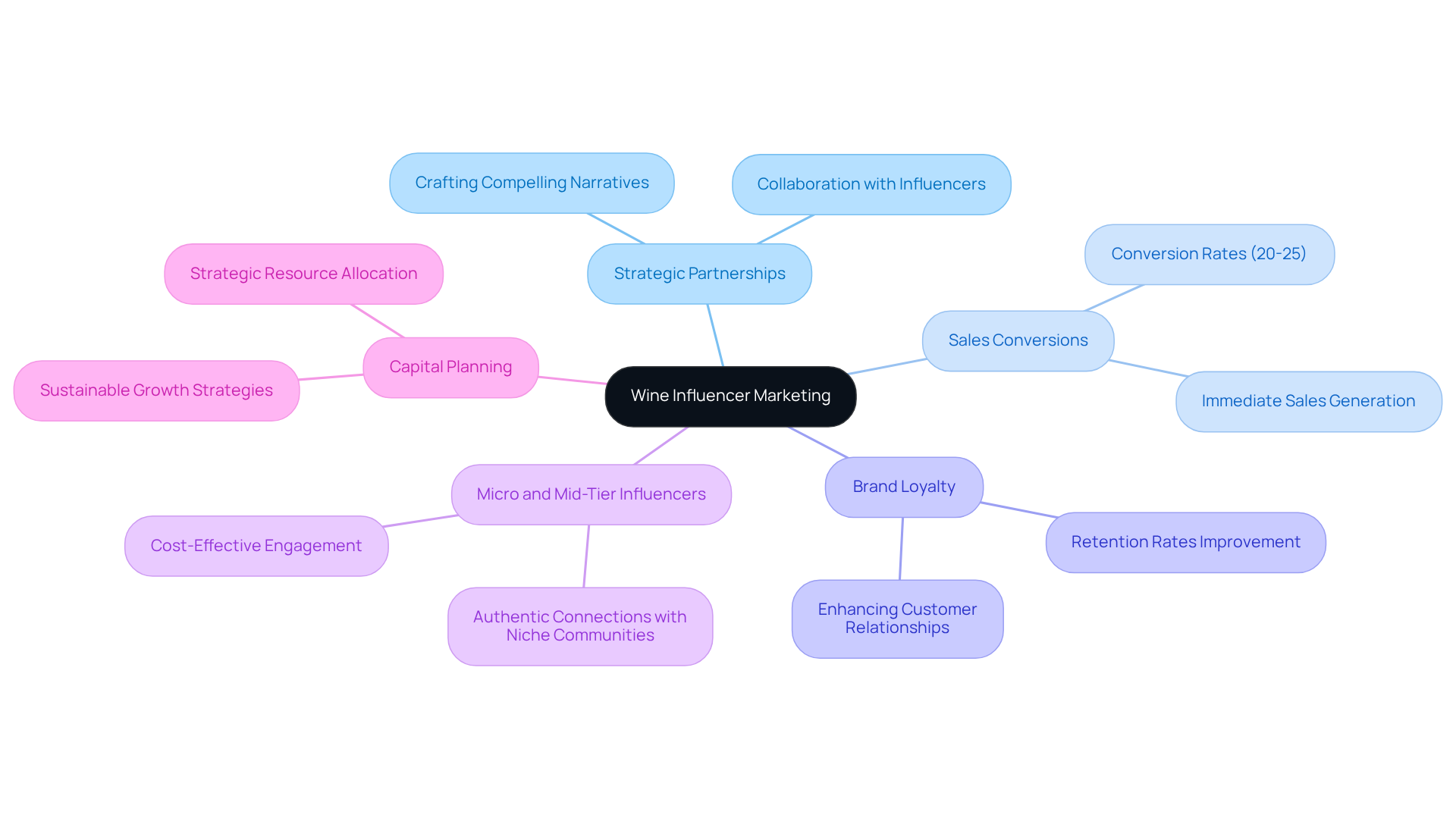
Identify Authentic Wine Influencers for Brand Alignment
To maximize the impact of social media promotion, wineries must prioritize wine influencer marketing by identifying genuine wine advocates whose values and aesthetics align with their brand image. This alignment is essential; it ensures that messaging resonates with the influencer's audience, leading to more effective campaigns. Notably, 69% of consumers trust influencers, friends, and family more than direct brand communications. This statistic underscores the importance of authentic connections in marketing efforts. Furthermore, 85% of Gen Z report that social media influences their purchasing decisions, making this demographic particularly significant for vineyards targeting younger consumers.
Utilizing tools like social media analytics can significantly aid wineries in assessing a promoter's engagement rates and audience demographics. For example, recognizing that 72% of TikTok alcohol influencer audiences are female allows for tailored campaigns that effectively target specific demographics. Additionally, with 45% of Gen Z preferring labels showcased by their favorite creators, collaborating with the right influencers can enhance visibility and consumer confidence.
Aligning effectively with wine influencer marketing not only fosters authenticity but also boosts engagement and conversions. Take Vivino's campaign, for instance, which partnered with diverse influencers and achieved 1.36 million post impressions along with over 11,000 post clicks. This demonstrates the power of authentic wine influencer marketing. Brands that prioritize these partnerships are more likely to experience positive outcomes, as long-term collaborations tend to yield higher brand recognition and loyalty. However, vineyards must also be mindful of potential challenges, such as the 49% of social media influencers who report experiencing burnout, which can adversely affect campaign effectiveness. By focusing on these strategies and considering the well-being of social media personalities, wineries can craft effective marketing campaigns that resonate with their target audience.
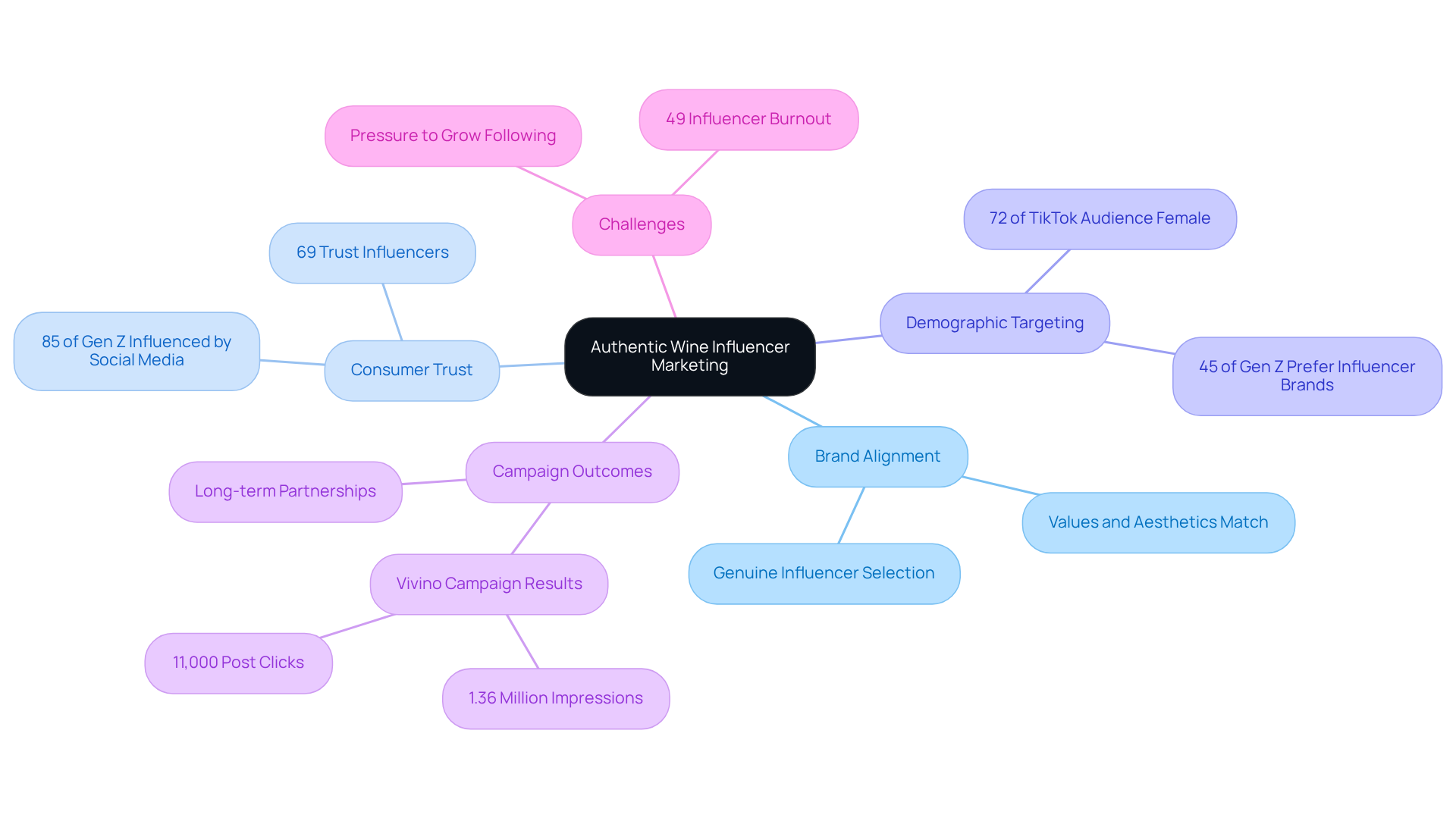
Craft Compelling Stories to Engage Wine Consumers
Wineries must craft compelling narratives that highlight their unique heritage, production methods, and the passion fueling their winemaking. By harnessing Enocap's expertise in media placement, PR, and content strategy, these stories can be effectively shared through wine influencer marketing, creating a deeper emotional connection with consumers. Have you considered how illustrating the journey of wine from vineyard to bottle can engage audiences on a personal level? This approach encourages consumers to choose their label over competitors.
Emotional engagement is vital in wine influencer marketing, as it drives consumers to gravitate toward brands that align with their values and experiences, significantly influencing their purchasing decisions. Notably, 27% of wine club registrations occur through digital channels, showcasing the measurable outcomes of these strategies. However, many producers struggle to pinpoint the unique aspects of their story and may hesitate to share setbacks due to fear of vulnerability. Enocap's strategic capital planning can help vineyards navigate these challenges, ensuring they possess the necessary resources to tell their stories effectively.
Consistency in messaging across platforms is crucial for impactful storytelling. To evaluate the effectiveness of their efforts, vineyards should monitor engagement rates and customer feedback, ensuring their narratives resonate with their audience. By embracing these strategies, wineries can not only enhance their brand presence but also foster lasting connections with consumers.
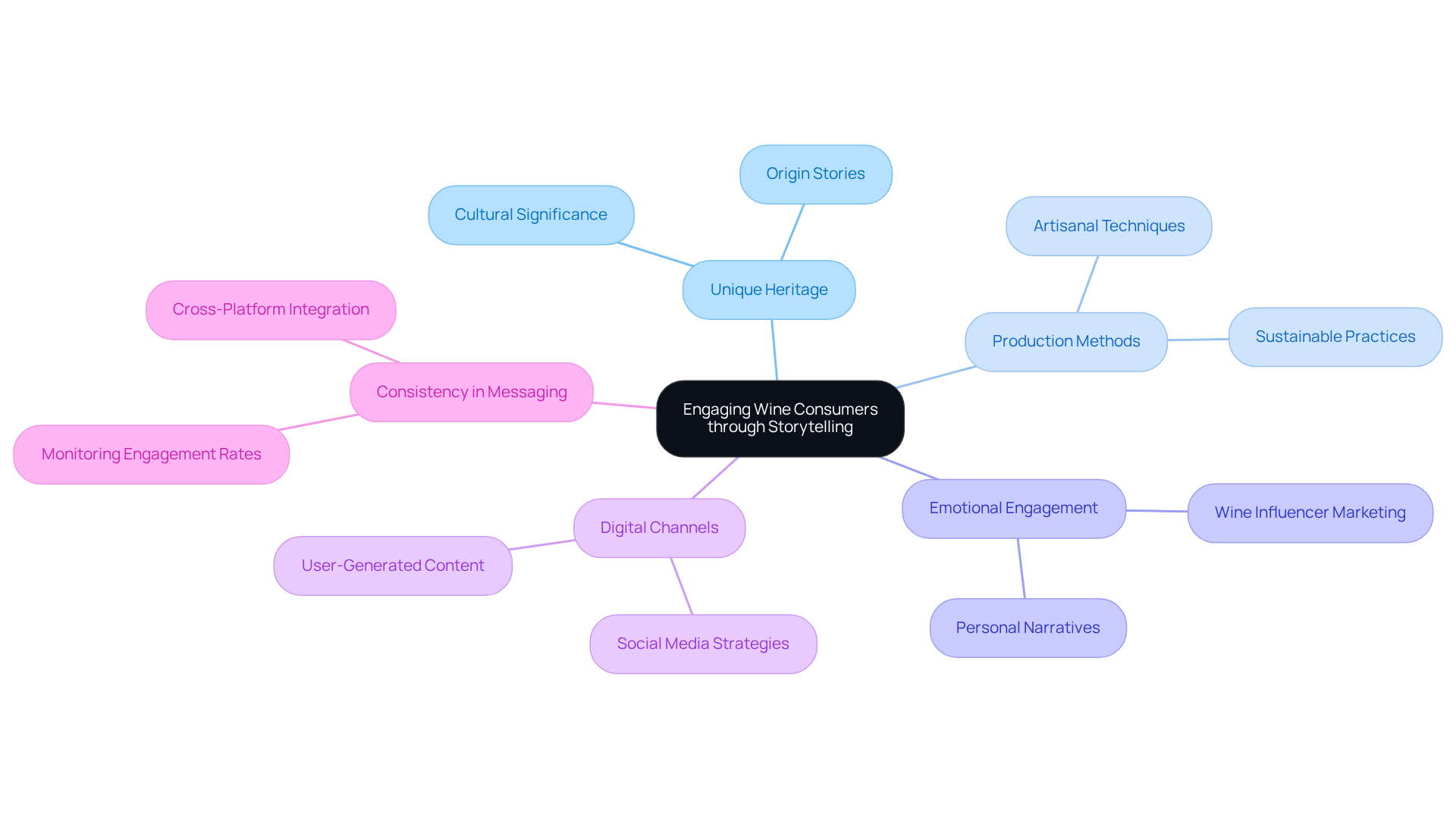
Measure Campaign Success with Key Performance Indicators
To effectively assess the success of promotion campaigns, wineries must establish clear key performance indicators (KPIs) such as engagement rates, conversion rates, and return on investment (ROI). Engagement rates reflect how well content resonates with audiences and can be measured through metrics like likes, comments, and shares. Notably, companies in the top 20 percent of promotional expenditure have reported a staggering 6.2x greater year-over-year enhancement in annual revenue, underscoring the potential impact of well-executed campaigns. Furthermore, these brands plan to increase their investment in wine influencer marketing through social media personalities by an average of 30 percent, highlighting its growing significance in the wine industry.
To assess ROI, vineyards should monitor the income generated from promotion partnerships against the overall expenditure incurred in these campaigns. Utilizing unique discount codes or affiliate links can help accurately attribute sales to specific influencers, providing a clearer picture of their effectiveness. A compelling example is a $50,000 marketing campaign that generated $250,000 in directly attributable revenue, resulting in an impressive 5X ROI.
Additionally, vineyards should track website traffic and social media follower growth during and after campaigns to evaluate long-term impact. With 85% of Gen Z indicating that social media influences their buying choices, monitoring these metrics is crucial for assessing the success of wine influencer marketing, particularly for vineyards that aim to reach younger consumers. By adopting continuous reporting methods and employing tools for multi-touch attribution, vineyards can gain deeper insights into consumer behavior and the overall efficiency of their promotional strategies. As Tim Sovay emphasizes, adopting and scaling wine influencer marketing efforts is vital for maintaining a competitive edge in the evolving wine industry. To further enhance their strategies, vineyards should consider creating templates for regular performance updates from influencers, ensuring they remain informed about campaign effectiveness.
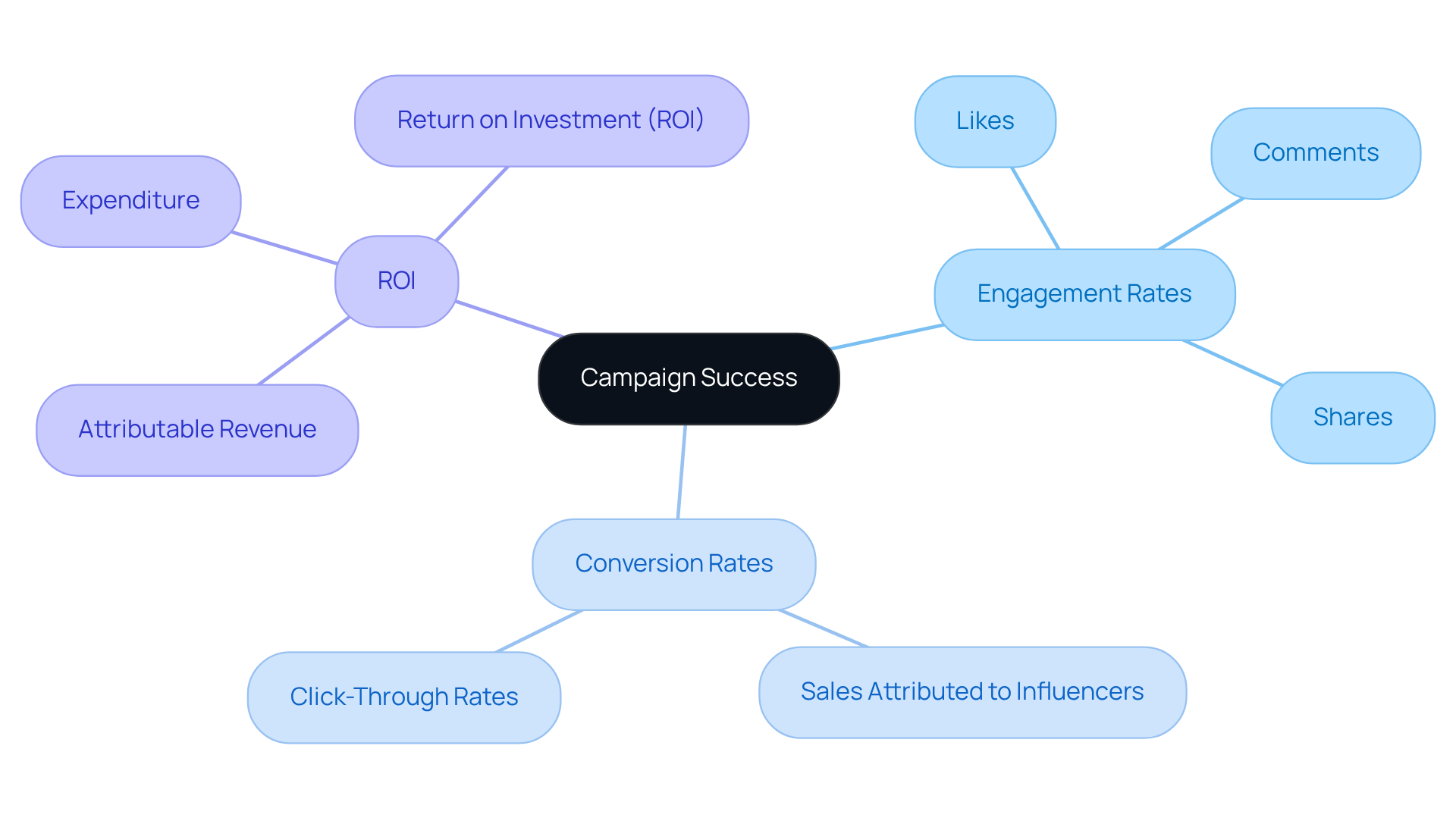
Leverage Social Media Platforms for Maximum Reach
Wineries must seize the opportunity presented by popular social media platforms like Instagram, TikTok, and Facebook to significantly enhance their marketing reach through strategic collaborations with key influencers in wine influencer marketing. Each platform serves distinct audiences and content styles, making it essential to tailor campaigns accordingly. For instance, Instagram thrives on visually captivating images and curated aesthetics, while TikTok favors engaging, dynamic videos that quickly capture attention. By grasping the unique characteristics of each platform, producers can craft customized content that resonates with their target demographics, ultimately driving higher engagement rates.
Wine influencer marketing on Instagram and TikTok has demonstrated promising engagement levels, with successful campaigns resulting in increased visibility and consumer interaction. This strategic approach not only amplifies reach but also cultivates authentic connections with potential customers. Moreover, integrating Enocap's innovative direct-to-consumer strategies, such as strategic capital planning, can empower producers to secure the necessary resources to enhance their marketing initiatives and ensure sustainable growth.
Are you ready to elevate your winery's marketing game? Embrace these insights and watch your engagement soar.
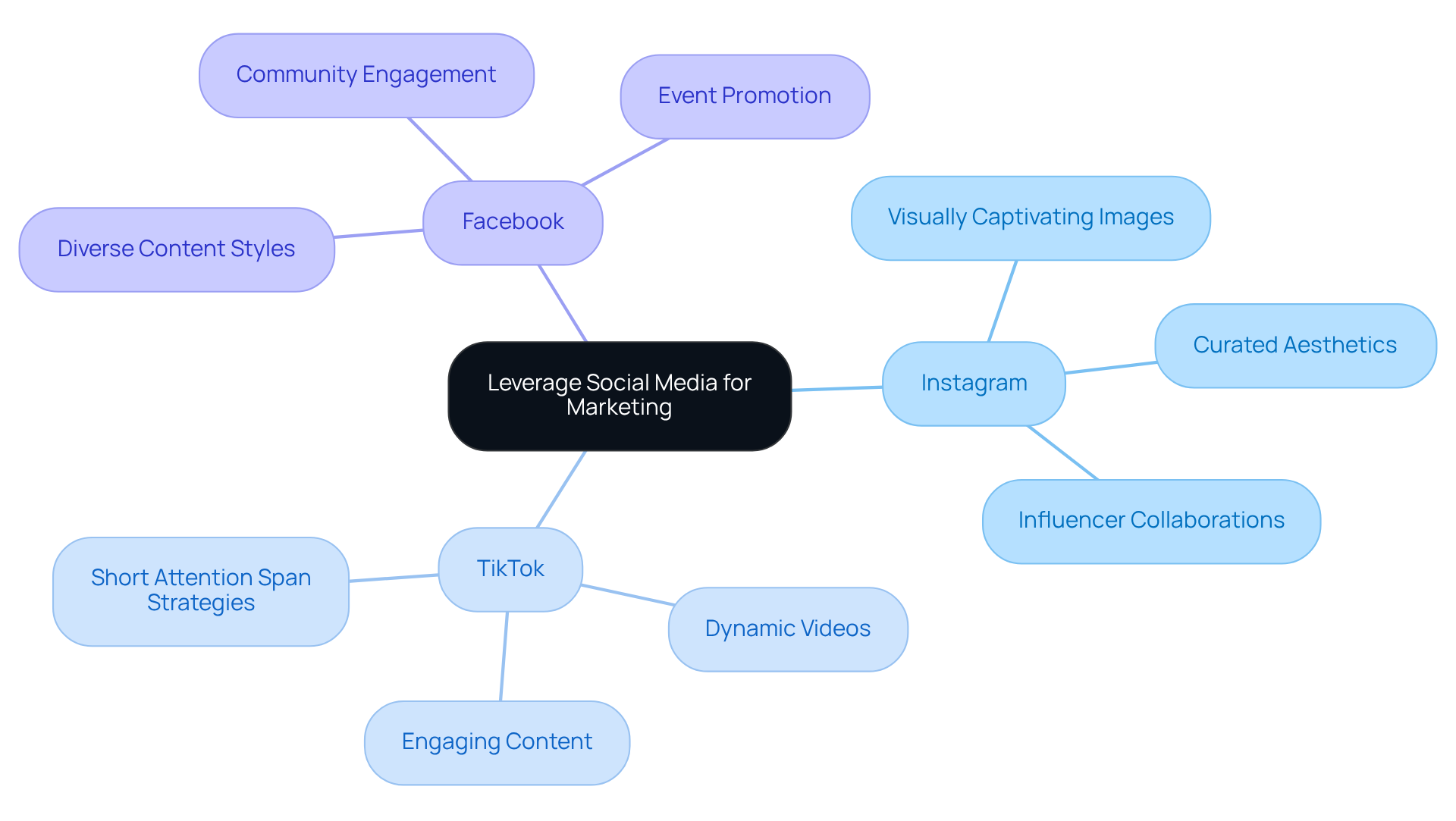
Build Long-Term Relationships with Influencers
Wineries must prioritize cultivating long-term relationships with carefully selected influencers for wine influencer marketing rather than relying on one-off collaborations. This approach not only establishes a consistent narrative that resonates with consumers but also aligns with Enocap's strategic capital advisory services, which are designed to unlock growth opportunities. Regular engagement with influencers in wine influencer marketing fosters authentic endorsements, enhancing brand loyalty and visibility in a competitive market.
Research indicates that companies can gain an impressive $6.50 for every $1 invested in influencer collaboration. This statistic underscores the financial advantages of nurturing long-term influencer partnerships. Genuine connections between influencers and their audiences can significantly boost sales and promote organic word-of-mouth marketing, particularly through wine influencer marketing. Such relationships enhance company identity and foster consumer trust, which is crucial for vineyards facing challenges like cash flow issues and the need for substantial consumer connections to thrive in today's dynamic environment.
By integrating direct-to-consumer strategies and effective storytelling, alongside securing the right capital, wineries can transform casual buyers into loyal club members. This transformation is essential for ensuring their legacy for generations to come.
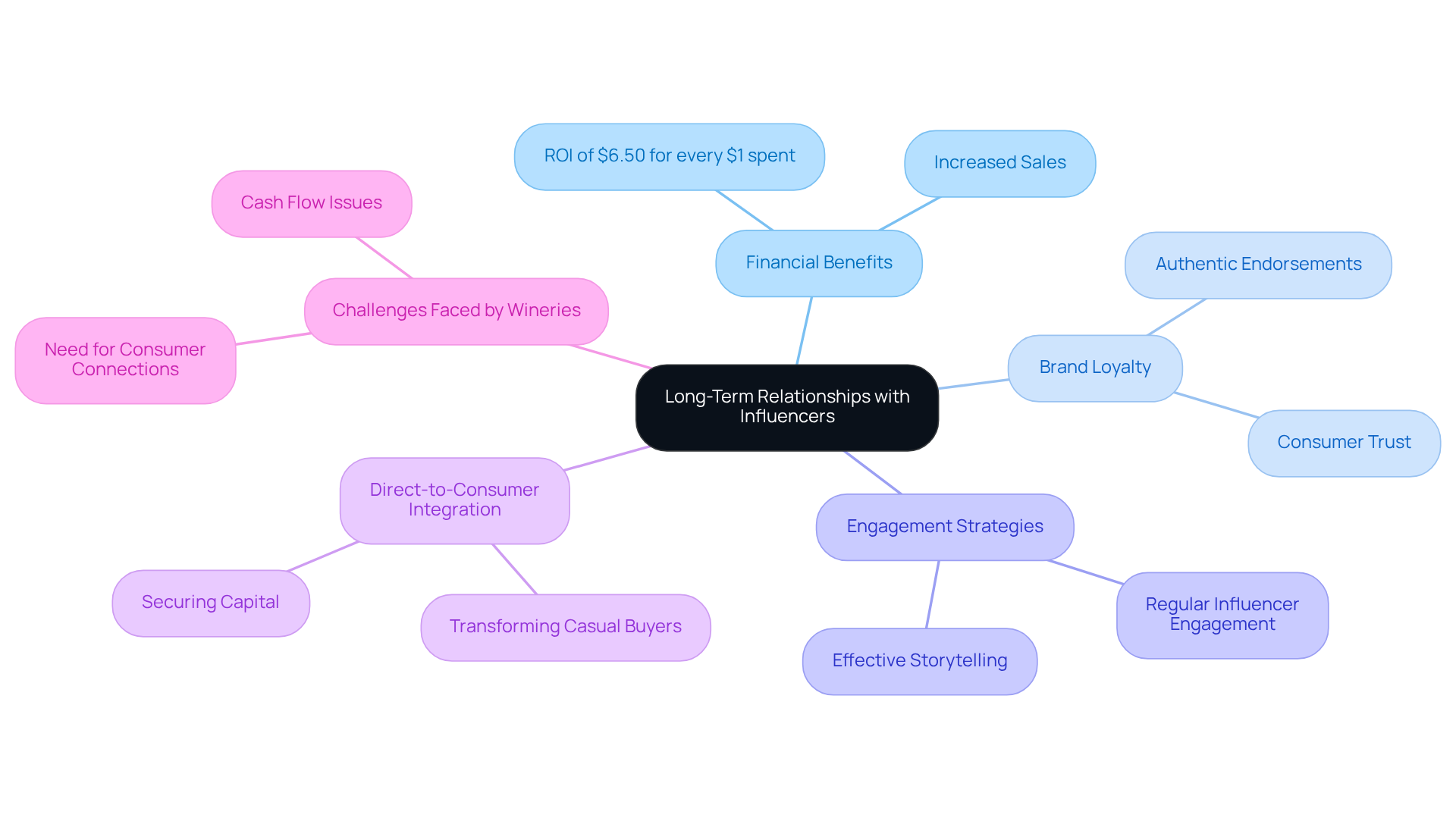
Adapt Strategies to Meet Evolving Consumer Preferences
Wineries must stay agile in their wine influencer marketing strategies to effectively respond to shifting consumer preferences. With a growing emphasis on sustainability and health-conscious choices among wine consumers, a significant portion now prioritizes eco-friendly practices in their purchasing decisions. By aligning marketing messages with these interests, wineries not only enhance their relevance but also broaden their appeal to a diverse audience.
Industry leaders emphasize that incorporating sustainability into product narratives can cultivate stronger connections with consumers. As they increasingly seek authenticity and responsibility from the companies they support, this alignment becomes crucial. Utilizing successful wine influencer marketing campaigns that highlight sustainable practices allows wine producers to effectively connect with health-conscious consumers, establishing themselves as leaders in the evolving wine market.
This strategic alignment with consumer values is essential for maintaining competitiveness and driving long-term growth. Are you ready to embrace these changes and lead the way in the wine industry? The time to act is now.
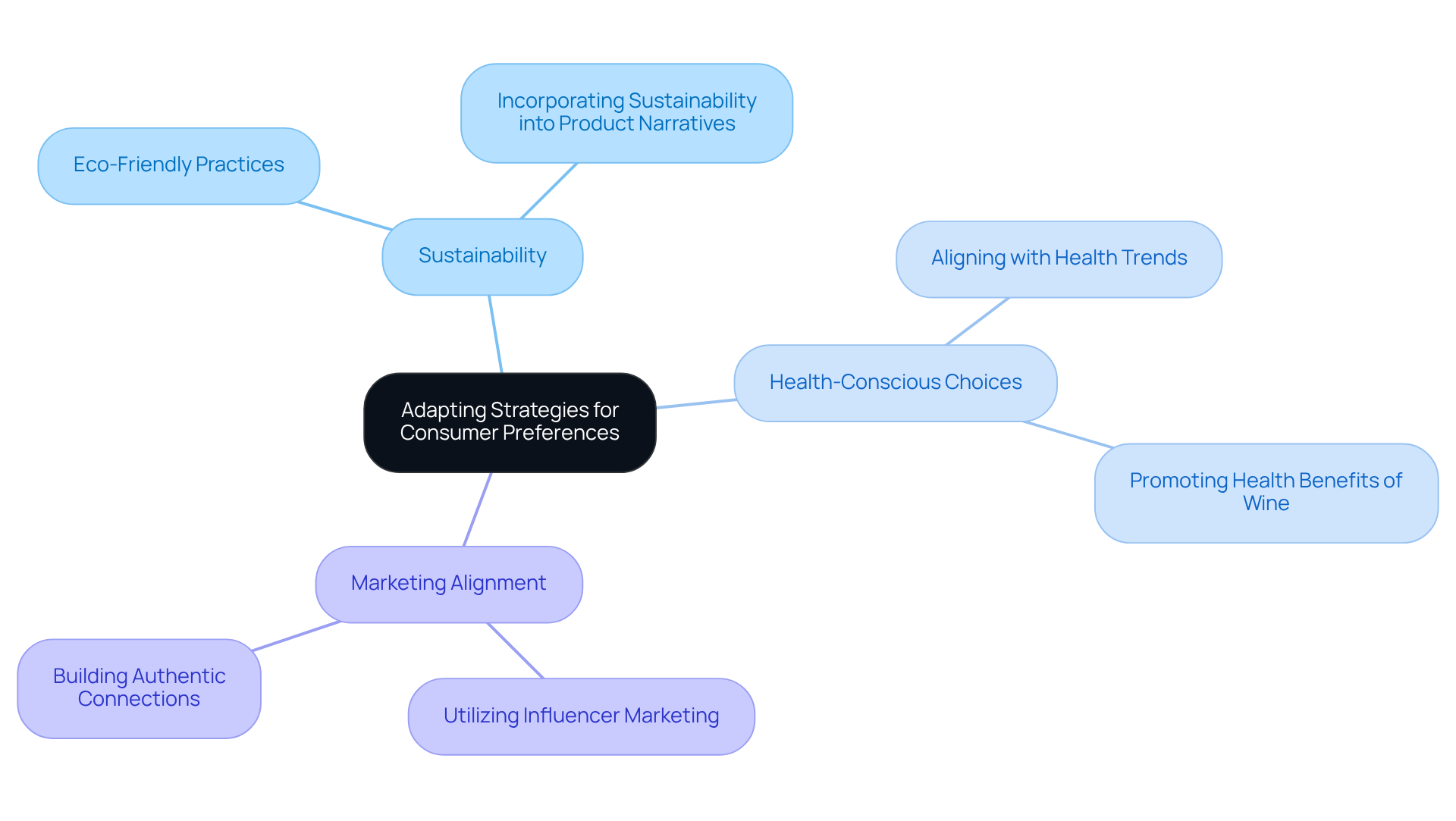
Enhance Brand Visibility through Influencer Collaborations
Influencer partnerships serve as a powerful catalyst for enhancing brand visibility, allowing vineyards to connect with new audiences. By collaborating with influencers who command significant followings, vineyards can effectively tap into these networks, gaining access to potential clients who may remain unreachable through traditional promotional methods. This strategy has proven successful; for instance, effective collaborations with well-known figures have led to remarkable increases in audience engagement, with some vineyards reporting up to a 215% rise in social media following and a 35% boost in conversion rates.
Data reveals that wine influencer marketing can dramatically expand audience reach within the wine industry. Partnering with micro-influencers, who often have more engaged audiences, enables vineyards to forge authentic connections that resonate deeply with consumers. A notable case study illustrated how a vineyard's strategic alliance with influencers resulted in a 67% surge in website visitors, underscoring the tangible benefits of these collaborations.
Statements from successful vineyards underscore the impact of brand partnerships on audience engagement. One vineyard remarked, "Collaborating with influencers has not only broadened our visibility but also fostered genuine connections with our customers, enriching our brand narrative."
In addition to enhancing visibility, vineyards should consider how these collaborative partnerships can align with strategic capital planning. By integrating wine influencer marketing along with sound financial strategies, vineyards can ensure sustainable growth and customer loyalty.
In conclusion, leveraging social media networks not only boosts visibility but also cultivates a loyal customer base, driving engagement and ultimately leading to increased sales for vineyards. To implement these strategies effectively, wineries should begin by identifying micro-influencers whose values resonate with their brand, thereby strengthening their direct-to-consumer efforts and securing long-term success.
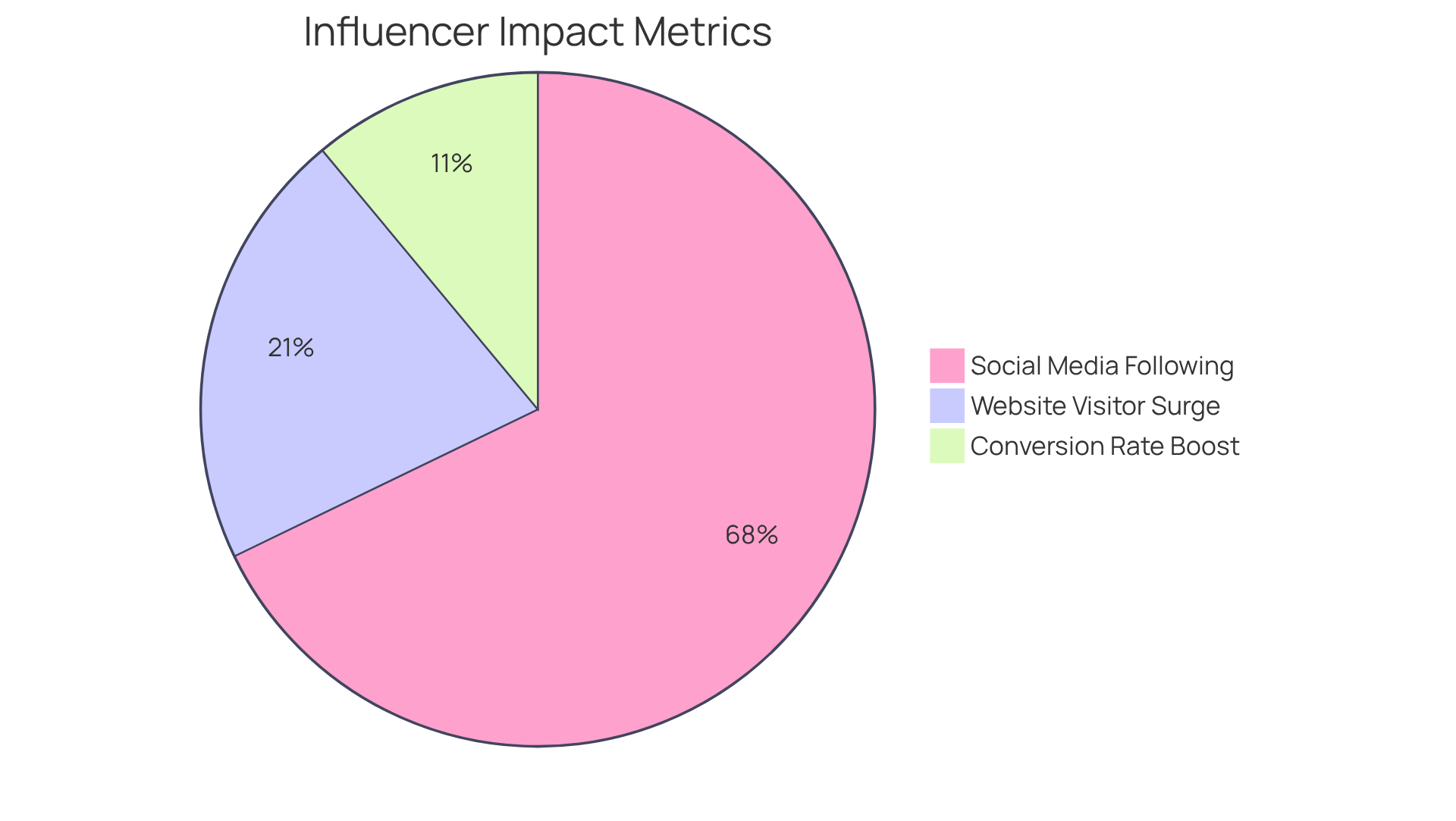
Avoid Common Pitfalls in Influencer Marketing
Wineries face significant challenges in wine influencer marketing, particularly the common mistake of selecting influencers based solely on follower count instead of genuine engagement and authenticity. As marketing strategist Mark Schaefer emphasizes, authenticity is about being consistently real, resonating more with audiences than mere numbers. Brands that prioritize engagement over follower count can dramatically enhance their campaign effectiveness. In fact, micro-influencers generate 60% higher engagement rates compared to larger accounts. Moreover, ongoing partnerships yield 4.5 times higher engagement rates than one-off collaborations, highlighting the importance of cultivating long-term relationships with influencers.
Setting clear expectations and guidelines is crucial to avoid miscommunication and ensure that campaigns align with company values. Successful campaigns by social media personalities often focus on building relationships with a select group of 3-5 key figures, nurturing deeper connections that lead to improved outcomes. By avoiding these common pitfalls and emphasizing genuine storytelling, vineyards can forge meaningful collaborations with wine influencer marketing that boost engagement and foster brand loyalty. Additionally, incorporating strategic capital planning into these promotional efforts can drive direct-to-consumer revenue growth, ensuring that family-owned wineries thrive sustainably in the competitive wine sector.
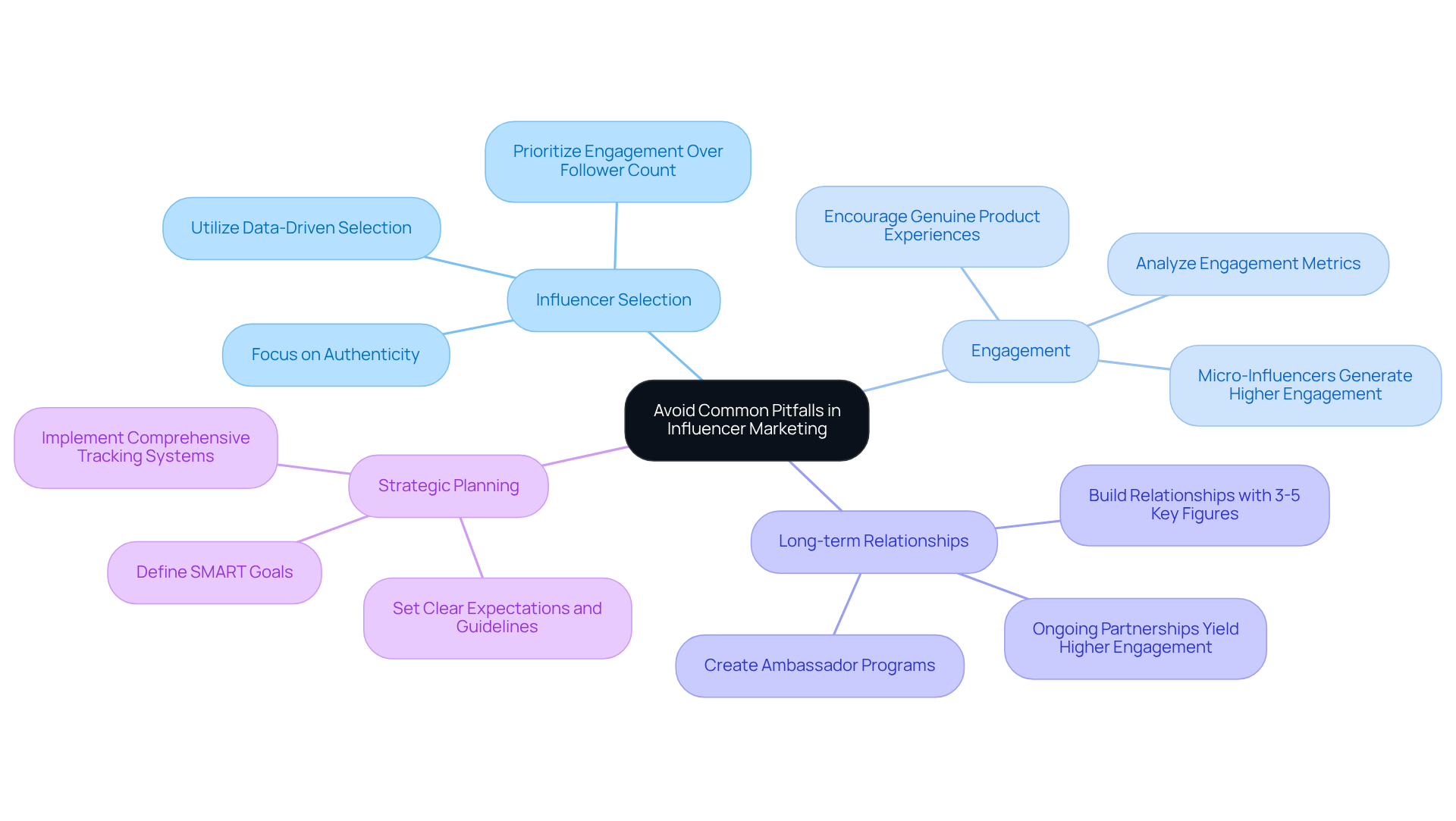
Stay Informed: Evolve with Influencer Marketing Trends
Wineries must remain vigilant regarding the latest trends in wine influencer marketing, particularly the growing importance of micro-influencers and the critical role of authenticity. Micro-influencers—those with 10,000 to 49,999 followers—have become pivotal players in the marketing landscape due to their highly engaged audiences. Research indicates that these influencers typically possess between 10K and 100K followers, making them essential contributors to wine promotion. This shift highlights the necessity of forging genuine connections with consumers through relatable and trustworthy recommendations.
To enhance promotional effectiveness, wineries should adapt their strategies to align with these trends. Leveraging AI tools for influencer promotion can yield valuable insights into emerging practices and assist in identifying influencers who resonate with brand values. As Eric Kunisawa, a leading marketing analyst, points out, 'Micro-influencers have emerged as key players in wine influencer marketing due to their highly engaged and loyal audiences.' By integrating these insights, wineries can forge stronger connections with their target audience and foster meaningful engagement.
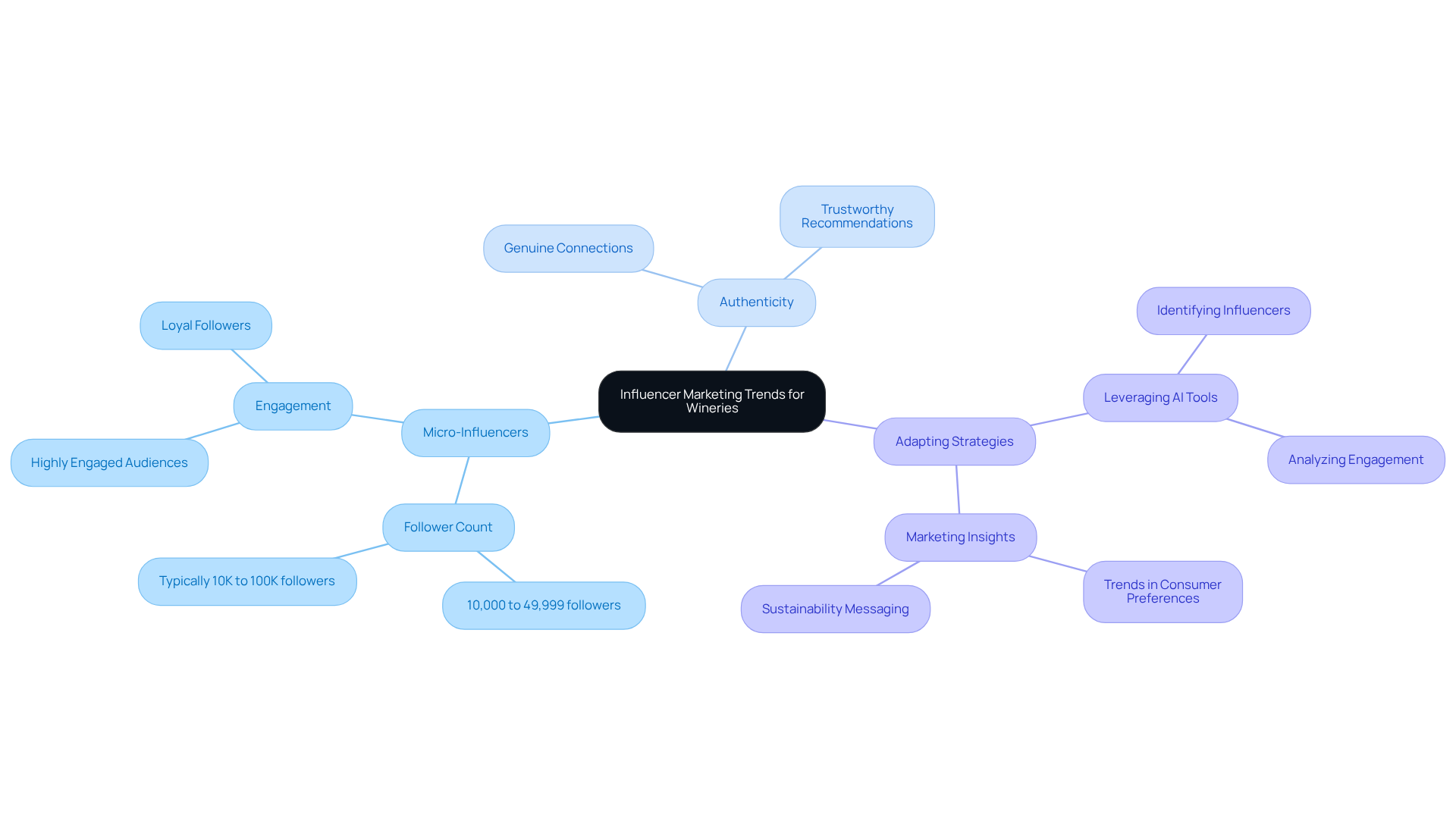
Conclusion
Embracing wine influencer marketing is not just a trend; it’s a powerful strategy that can significantly elevate direct-to-consumer sales for vineyards. By forging authentic partnerships with influencers who genuinely connect with their target audience, wineries can boost immediate sales and cultivate lasting customer loyalty. This approach underscores the critical role of storytelling and strategic capital planning, ensuring that wineries stay competitive in a rapidly changing market.
Key insights throughout this discussion highlight the necessity of:
- Identifying genuine influencers
- Crafting compelling narratives
- Effectively leveraging social media platforms
The data reveals impressive engagement rates achieved through micro-influencers, alongside the financial advantages of nurturing long-term relationships. Moreover, measuring campaign success through clear key performance indicators reinforces the need for wineries to remain agile and responsive to shifting consumer preferences.
The importance of adapting marketing strategies to align with evolving consumer values cannot be overstated. By prioritizing authenticity, sustainability, and engagement, wineries can enhance their brand visibility and foster deeper connections with their audience. As the landscape of wine marketing continues to evolve, now is the time for vineyards to embrace these insights and lead the charge in innovative influencer collaborations that drive growth and customer loyalty.
Frequently Asked Questions
What is Enocap and how does it help vineyards?
Enocap empowers vineyards to drive direct-to-consumer (DTC) revenue through strategic partnerships with influencers, enhancing visibility and fostering personal relationships with consumers.
What are the benefits of wine influencer marketing for vineyards?
Wine influencer marketing generates immediate sales, cultivates customer loyalty, and establishes vital partnerships as part of a winery's promotional strategy.
What sales conversion rates have been reported from successful influencer marketing campaigns in the wine industry?
Companies leveraging influencer partnerships have reported sales conversions ranging from 20% to 25%.
Why is social media promotion important for wineries?
Wineries that overlook social media promotion risk falling behind in a competitive landscape, as it enables them to convey their message to a targeted demographic.
How can vineyards identify authentic wine influencers for their brand?
Wineries should prioritize finding genuine wine advocates whose values align with their brand image, ensuring effective messaging that resonates with the influencer's audience.
What statistics highlight the significance of influencer marketing?
69% of consumers trust influencers more than direct brand communications, and 85% of Gen Z report that social media influences their purchasing decisions.
What tools can help wineries assess potential influencers?
Social media analytics can aid in evaluating an influencer's engagement rates and audience demographics.
Can you provide an example of a successful influencer marketing campaign in the wine industry?
Vivino's campaign, which partnered with diverse influencers, achieved 1.36 million post impressions and over 11,000 post clicks, demonstrating the power of authentic marketing.
What challenges do social media influencers face that vineyards should consider?
About 49% of social media influencers report experiencing burnout, which can negatively affect campaign effectiveness.
How can wineries craft compelling stories to engage consumers?
Wineries should highlight their unique heritage and production methods, using Enocap's expertise in media placement and content strategy to create emotional connections with consumers.
What role does emotional engagement play in wine influencer marketing?
Emotional engagement drives consumers toward brands that align with their values, significantly influencing purchasing decisions.
How should vineyards monitor the effectiveness of their storytelling efforts?
Vineyards should track engagement rates and customer feedback to ensure their narratives resonate with their audience.




